Undergraduate & Graduate Student Awards
Galileo Circle Scholars, the University of Arizona's finest undergraduate and graduate science students, represent the tremendous breadth of research interests in the College of Science
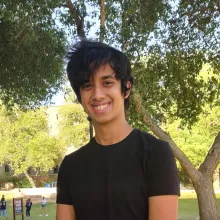
Galileo Circle Scholar: Adi Banerjee
Adi Banerjee is a sophomore pursuing a BS degree in Computer Science with a minor in Statistics and Data Science. Adi was born and raised in Mumbai, India, but he chose to attend the University of Arizona because of the university's generous financial aid and Arizona's potential for growth as a tech and research hub. His interest in computer science is really a product of his interest in math and his personal belief that software has the potential to solve almost any problem. Adi has been particularly interested in learning and using the math behind machine learning and artificial intelligence to create community-driven software solutions, which he thinks fits perfectly under the umbrella of a computer science degree!
As a CS student, Adi founded and currently runs the Google Developer Student Club at the University of Arizona, which provides students with access to Google's learning resources and various other workshops, technical talks, and networking opportunities throughout the year. He has also been working to foster a more tightly-knit CS community through his club's collaborations with other universities across the country and even with clubs at the UofA. Adi also contributed to the university and Tucson community through his work as a sustainability representative on Hall Council and community service at Tucson Trees Please and the Southern Arizona AIDS Foundation. In his free time, he enjoys reading, playing RPG-style video games, and watching anime, but he has recently also been having fun teaching himself to play the piano!
Adi has been working as an undergraduate research assistant on ToMCAT at IVILAB since he joined the university in Fall 2019. They are developing a suite of modular, open-source AI technologies to support human-machine teaming, and the novelty of the project lies in that we are attempting to combine current state-of-the-art approaches to create AI teammates capable of inferring the internal states of other agents, solving problems collaboratively, and communicating in a socially aware manner. His work on the project has involved creating a procedural generation library and developing some of the data collection tools used in AI testbeds. He also works as a software developer at Eller Tech Core. Specifically, he uses the full stack of technologies involved in web app development, including CSS, JS, C#, and SQL, to develop and maintain sites for the projects that Tech Core contracts. He has also had the opportunity to work with some exciting VR Technology using Aframe.
Adiâs career goal is to work as a software developer in the industry and eventually return to graduate school to pursue a PhD. Adi has not yet decided what he wants to specialize in, and he hopes that his experience working in the industry will help him make his choice. Adi would like to acknowledge Dr. Adarsh Pyarelal (School of Information) and Dr. Kobus Barnard (Dept. of CS), who have been (and continue to be) amazing and incredibly supportive mentors on ToMCAT. He would also like to acknowledge Arthur Jordan (Dept. of CS) for all the absolutely instrumental support he has given the Google Developer Student Club.
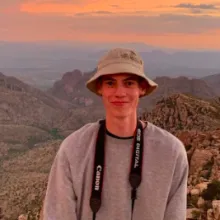
Galileo Circle Scholar: Tristan Farrell
Tristan Farrell is a junior pursuing a BS degree in Computer Science. Tristan was born in Montana, but moved to Tucson when he was young. He decided to go to the UA because it was always the local university he wanted to join and the fair tuition price, scholarships, and good reviews from his two older brothers who attended made it an easy choice. Tristan initially intended to major in Engineering, but switched into CS almost instantly because he had researched software development the summer before school and he recognized the wide range of opportunities available to developers and the nearly infinite aspects of the world software can benefit. Tristan was still unsure of what he wanted to work on when he was older so learning a valuable skill with many possible areas of application seemed perfect to him.
Tristan has been involved in helping the community throughout his life, in school and in various clubs like National Honor Society and Spanish Honor Society which focus on giving back in various ways. He continues volunteer work in University individually and with events hosted by the Cactus Cats group. When he first got to University he worked in places like Highland Market and The Den serving food to students. Then after passing CSC 120 he became a Teaching Assistant with the CS department. Tristan loves helping students learn to code and understand their projects in new ways. He is currently a TA for CSC 120 and has been a UGTA for various classes for 4 semesters now and it has been incredibly rewarding work. Tristan is currently also the IdeaLab coordinator where he worked with Arthur Jordan to create a community to facilitate student growth outside of class by assisting with personal programming projects and providing workshops and events. It has been hard to grow IdeaLab online due to Covid, but he is excited for next semester when IdeaLab can host more events in-person.
In his free time and when he is not coding or working, Tristan likes to learn new things in a variety of areas. A few of these areas include music, art, philosophy, science, investing, and technology. He has been learning to make music on his laptop and spend most of his time off doing this. He also likes to make art that does not require drawing so he experiments with pouring and spinning paint. Tristan likes to read as well and heâs currently enjoying "The Age of Spiritual Machines" by Ray Kurzweil. He is also interested in achieving financial freedom so he spends a fair amount of his time off learning more about investing and other methods to do so. Lastly, he always enjoys spending time with friends and family and being out in nature. Tristan was a remote technology intern at American Express last summer where he worked on a web application with some fellow interns and learned a lot about what it's like to develop software professionally. This summer Ihe is set to intern with Microsoft remotely as a software engineer on the whiteboard team. He can't wait!
Tristanâs career goal is to graduate from the UofA with a BS in Computer Science and use the knowledge and experience he has gained to work on meaningful projects that will help the world. He believes that the world is going through a period of very rapid development facilitated by many new technologies and innovators who are determined to change the world. He hopes to assist in this development and help skew the results towards more universally beneficial solutions. This may be through developing software at an innovative company with a mission he believes in, or perhaps attempting to blend his knowledge of software, music, art, etc. into a new mission. Whatever it ends up being, he is grateful for the opportunities he has been given and he hopes to give and take knowledge from those around him and work on helping the world one way or another.
Tristan would like to thank all the people he considers family in his life, he could not do it without them. He would also like to thank the various professors who have taught and inspired him. He would also like to specifically thank, a UA CS alumni Alex Wong who showed him so much support when he came to UA and encouraged him to take advantage of the many opportunities around him.
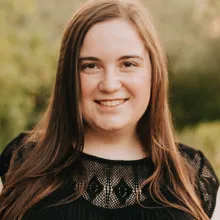
Galileo Circle Scholar: Caroline Hyland
Caroline Hyland is a sophomore pursuing dual degrees in Computer Science (BS) and Spanish (BA) with minors in Molecular and Cellular Biology and Psychology. Caroline is from Phoenix, Arizona and she chose the University of Arizona in part because of a scholarship offer and in part because of the sense of community she felt on campus. She is a third generation Wildcat, so she has always felt at home here. Caroline chose Computer Science late in her high school experience. She took a few Computer Science classes in high school, and her teacher inspired her to pursue it as a major; which she is very glad about it now.
Caroline is very passionate about representing the Computer Science department and the university as a whole. She is a member of Arizona Ambassadors, a College of Science ambassador, and a Computer Science department ambassador. She works as an Undergraduate Teaching Assistant (UGTA) for the Computer Science department, specifically for CSC 245 (Introduction to Discrete Structures). Additionally, she has been active in supporting the local Tucson community through philanthropic events organized by a variety of groups on campus in which she participates.
In her free time Caroline loves to travel and explore new places whenever she can. If she has a break in her schedule, she can often be found sitting in the shade reading a book or just catching up with friends. Caroline is looking forward to her first internship in software engineering this summer. As a sophomore, she is still exploring a variety of career options in Computer Science and is unsure whether she wants to enter into industry immediately after graduation or first pursue a graduate degree.
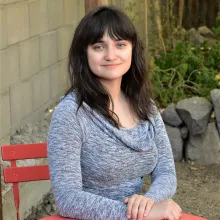
Galileo Circle Scholar: Kapua Ioane
Kapua Ioane is a sophomore pursuing a BS in Computer Science and a minor in American Sign Language. Although Kapua is of Hawaiian Heritage, she is a 4th generation born and raised Tucsonian. She chose to go to the UA because she was chosen to be a Dorrance Scholar, and she didn't want to pass up the opportunities that the Dorrance Scholarship Programs would offer her. Computer Science was an easy decision because of a teacher she had in high school who really showed her how great it could be. Kapua used to have no interest in CS, and it seemed to be one of her least favorite STEM fields, but after a class with this teacher, she fell in love with the discipline and was really able to make it her own. Kapua loves how structured coding is, but also how it encourages creative thinking.
As a CS student, Kapua has worked as an Undergraduate Teaching Assistant (UGTA) for two semesters, Course Coordinator in Training (CIT) for one semester, and beginning a role as a Course Coordinator (CC) next semester and she is a CS Ambassador. Outside of the department, she is an active member of Theta Tau. Outside of the UofA, she works with teachers and educators on promoting STEM curriculum and teaching teachers how to incorporate STEM in the classroom. In her free time, Kapua likes to swim, bake, spend time with her family, and prank friends.
Kapua was an intern with Pima County Superintendent's office STEMAZing Project, working with preK-12 educators in Southern Arizona and currently Interns with Axon as a Software Engineering Intern on the Record Management System team. Her career goal changes every other day. She loves her work with Axon, but is also wanting to move industries. She has an interest in working with cars to some extent improving the automation in them, and she has always wanted to work on deep space spacecraft. There is so much to choose from - she has no idea what she wants to do. Kapua would like to thank Scott Weiler for opening the first door, Daniel Schnieder for being awesome, Russ Lewis for being an amazing professor, and all of her friends for being supportive and helping her through everything.
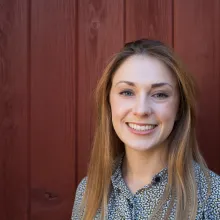
Galileo Circle Scholar: Marina Kisley
Marina Kisley is a 3rd year grad student pursuing a PhD in Computer Science with a minor in Science Communication. Marina grew up in northern Virginia, got her B.S. in Computer Science from Virginia Tech, and worked as software consultant for two years after graduation. She came to CS at UA because of Dr. Kobus Barnard, her advisor who set her up with some very exciting interdisciplinary projects in astronomy and planetary sciences, which she still pursues today.
During her time as a graduate student Marina has served twice on a departmental committee appointed with selecting a new CS department head. She has worked as T.A. in the department during the 2020-2021 academic year. Over the past few years she has participated in different outreach events; in 2020 she served as a coach for the Machine Learning Literacy Project workshop, a one-day crash course on machine learning. Marina helped organize the local Women in Data Science conference at UA in 2020 and was a speaker in a Mixed Experiences Panel for the CS department's Women in Computer Science organization in 2019 and 2020. Earlier this year, Marina served as a selection panelist for a grant (up to $10,000 per applicant) awarded by the American Association for University Women (AAUW), designated for organizations seeking to encourage girls to pursue STEM in college. Marina recently became a member of our local AAUW chapter in Tucson, where she hopes to support their outreach initiatives.
Since arriving in Tucson, she has spent as much time as she can hiking around Mount Lemmon and walking her dogs. Her most intense hikes to date are Finger Rock and Miller Peak, which are as difficult as people make it sound, although the views are pretty great. She also enjoys playing games with friends and reading.
As an undergraduate student she interned at a satellite software communications company in Virginia, as well as a research internship at Los Alamos National Laboratory in New Mexico. Marina worked as a software consultant for two years before coming to UA, where she now does research in machine learning applications in astronomy and planetary sciences. Marinaâs career goal is to remain in her field of research after graduation, pursuing interdisciplinary work in machine learning and astronomical or planetary sciences. She hopes to work in either a national laboratory, government space agency (NASA, JPL, etc.), or a university, either in the U.S. or abroad. She would also like to promote science literacy in the public and support underrepresented groups in STEM.
Marina would like to acknowledge the continual support from her advisor, Dr. Kobus Barnard, and their collaborator in the astronomy department, Dr. Ann Zabludoff. She also appreciates her early guidance and support from the professor she did her undergraduate research with in the astronomy department at Virginia Tech, Dr. Duncan Farrah.
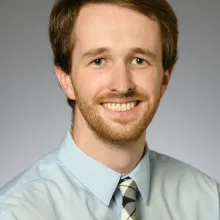
Galileo Circle Scholar: Spencer Krieger
Spencer Krieger is a 5th year grad student pursuing a PhD in Computer Science. Spencer grew up in Salt Lake City, Utah and he came to the UofA because of the excellent bioinformatics research done by Dr. John Kececioglu. Spencer originally got his Bachelor's degree in biochemistry, but switched to computer science when he realized he did not like doing web lab work and would rather devise new algorithms for bioinformatics.
During his time as a grad student, he has been the vice president of the CS Graduate Student Council, served as the graduate student on the Graduate Affairs Committee, and served as the graduate liaison for the Faculty Recruiting Committee. In his free time, Spencer likes to play any and all racquet sports. He has played intramural racquetball, he plays pickleball and squash weekly, and occasionally plays tennis when the weather is cooler. He also owns over 250 board games, and plays 650 board games on average each year.
Spencer recently published a paper in a top conference in his field on protein secondary structure prediction and is currently researching algorithms for finding shortest hyperpaths in hypergraphs, which are the best model for cell-signaling pathways, but are rarely used, due to their computational complexity. His career goal is to have his own research lab at a research university. Spencer would like to give a special thanks to his research advisor, Dr. John Kececioglu, for helping him achieve his research goals.
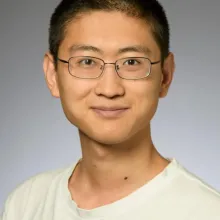
Galileo Circle Scholar: Zhengzhong Liang
Zhengzhong Liang is a 3rd year grad student pursuing a PhD in Computer Science. Zhengzhong is from Shandong, a province in the east part of China. He was an undergraduate student at Shandong University from 2011 to 2015, mainly studying power systems. However, he found he was more interested in Artificial Intelligence (AI) and Machine Learning (ML) instead of power systems during his undergraduate study, so he came to UA, a great university with reputable ML/AI teams. Zhengzhog was a master student at UA's ECE department from 2016 to 2018, mainly studying artificial neural networks, and joined the CS department of UA in 2018 as a PhD student, studying Natural Language Processing (NLP).
As a grad student, Zhengzhong loves to discuss papers and research ideas with his colleagues and lab partners. He also reviewed the major fields of Artificial Intelligence (AI) and Natural Language Processing (NLP) in recent years by looking at the tutorials of the top AI/NLP conferences. He composed a big chart analyzing the trends in NLP research using those tutorials, and published the chart in CLU Lab's Github page, and he hopes the chart is helpful to our lab members.
In his free time, Zhengzhong likes to sleep, play basketball, watch movies and play video games. Zhengzhong will be starting an internship in summer 2021 at the Allen Institute for Artificial Intelligence (AI2). His career goal is to make Artificial Intelligence (AI) more intelligent by designing more interpretable and more robust AI algorithms. He is particularly interested in figuring out what we can learn from a human's cognitive process and how to use those observations from cognitive science to improve deep learning.
Zhengzhong would like to thank Dr. Mihai Surdeanu and other faculty from CLU lab/CS department for their instructions on his research topics, their trust in him and their consistent support. He would like to thank his wife, his other family members and his friends for their faith in him. Finally, he would like to thank lab lab partners for the invaluable help they gave him when he encountered research problems.
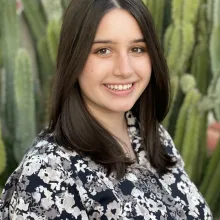
Galileo Circle Scholar: Sage Pezzulo
Sage Pezzulo is a Junior pursuing dual degrees in Computer Science (BS) and Information Science & Technology (BS). Sage was born and raised in Tucson Arizona, and knew that she wanted to go to an in-state school, but what made her decide to attend the University of Arizona was the fact that both of her parents are Wildcats. Most of her life she was convinced she would go to medical school to become a doctor, but in her junior year of high school, she did a lot of thinking and decided that medicine was not for her. Around the same time she was a participant in a club called Girls Who Code, which ultimately inspired her to pursue computer science in college.
As a CS student, Sage has been an undergraduate teaching assistant for CSC 110 for the past two semesters. She is an ambassador for the Computer Science department and has also been helping with some of the Computer Science departmentâs diversity, equity and inclusion initiatives , which led to the development of the diversity portion of the departmental website. Along the same lines, she founded the DEI advisory board and is currently serving as the chair. Outside of school, Sage loves to cook/bake, hang out with her friends, travel and she is currently an active member in the Phi Sigma Rho sorority.
Sage has not had an internship yet, but this Summer she is extremely excited to work as an intern for Arizona Public Service with their Information Technology Service Management team. Her career goal is to begin working in industry directly after college! Currently she is interested in user experience and human computer interaction, but she is excited to continue to learn about topics in computer science to discover other areas where my interests might lie.
Sage would like to thank Dr. Levine, Martin Marquez and Alex Hernandez for not only supporting her in her interest in promoting diversity, equity and inclusion in computer science, but also helping her navigate being a CS student. She would also like to thank her Dad who inspires her daily and always believes in her even when she doesn't believe in herself.
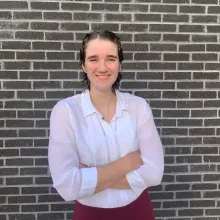
Galileo Circle Scholar: Kiana Thatcher
Kiana Thatcher is a sophomore pursuing dual majors in Mathematics (BS) and Computer Science (BS). Kiana is from South Carolina, but she was actually born in Tucson, Arizona. She chose to attend the University of Arizona because it has all the attributes that she values in a school â a large student body and campus with warm weather, a deep-rooted cultural presence, and a very strong College of Science. It also provides a lot of opportunities and resources that students can take advantage of to get involved. Kiana chose computer science because she believes that computer science and programming are very relevant skills to have in todayâs society. Everyone uses technology, thus there is a need for those who can run the programs that everyone uses. She is particularly interested in how computer science and math can be used to visualize and analyze data.
Kiana recently became a member of the RiskRunners, an actuarial club. Additionally, she started volunteering at the University of Arizona vaccination site. Outside of school, Kiana enjoys hiking and exercising outdoors (her favorite exercise is the burpee). She also likes to read in her free time. Kiana is currently working as a research assistant for Dr. Stephen Kobourov, a well-known researcher in data visualization and data representation and a professor for the Computer Science department. She is currently working as part of his team to create an interactive Global Research Query System that provides data and graphics about research being conducted in the top 1,000 ranked universities in the world. Through participating in research with Dr. Kobourov, she has learned many new programs and tools. For example, she learned how to use databases to query and aggregate large amounts of data and how to use code to visualize the data in an easily digestible manner. Her experience researching with Dr. Kobourov has strengthened her desire to pursue computer science and has opened her eyes to the world of data visualization in relation to data science.
Kianaâ's career goal in the near future, is to pursue a master's degree in statistics where she will continue to explore the various applications of data science. With these skills, she either wants to become an actuary or attain a Ph.D and conduct research as a professor. Kiana would like to recognize Dr. Stephen Kobourov for allowing her to be a part of his research team and helping her to explore the world of data visualization through coding. She has learned a lot about programming, data analytics, and conducting research from this experience and is very appreciative to have gotten this valuable opportunity.
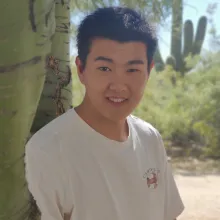
Galileo Circle Scholar: Mason Yin
Mason Yin is a senior pursuing dual majors: BS in Computer Science and Mathematics. Mason is from Tucson, Arizona and he chose the UofA because it is close to home and offered him the most scholarship money. He chose CS because the rapid development of Computer Science extends into interdisciplinary fields, which allows him to work in various industries from business to health.
Under the supervision of Dr. Kobourov, Mason has worked in the CS Department as an undergraduate research assistant doing research on Drawing Graphs on the Sphere. In his free time, Mason enjoys road cycling, watching anime and playing video games. His career goal is to become a software engineer or get involved in small, growing tech companies. He would like to give a special thanks to professor Kobourov for all his guidance and support.
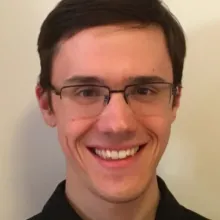
2020-2021 College of Science Excellence in Undergraduate Research Winner: Ben Jacobsen
Ben is a senior pursuing a major in mathematics with a minor in Computer Science (CS). He was born in Albuquerque, NM and attended public school before completing his associates degree at Central New Mexico Community College. Ben came to UA because it was close to home, had strong academics, and offered generous financial aid.
Ben's interest in computer science originally stemmed out of a love of philosophy and math. He started teaching himself programming when he was around 16 (beginning with Haskell, which he doesn't regret a bit), and really enjoyed the creative power it gave him. Since then, Ben has come to appreciate the social and political aspects of CS as well.
Ben has worked with the CS department on two separate research projects. He worked with Dr. Kobourov between November of 2019 and January of 2021 on the problem of set visualization. Under Dr. Kobourov's guidance, Ben helped to design, develop and analyze an online system called MetroSets - which lets anyone create metro-map-style visualizations of their data. They also conducted a controlled user study which found that users preferred MetroSets to other well-known set visualization tools, and also performed better when using visualizations made with MetroSets. Separately, Ben has worked with Dr. Saumya Debray on the problem of authorship attribution for code. The basic idea is that different programmers have different stylistic quirks - say, preferring while loops over for loops - which make it possible to figure out that they wrote a piece of code, even if they release it anonymously. This sort of technology obviously has the potential to violate people's privacy, and so we've been working to create a tool that can trick state-of-the-art classifiers into incorrectly guessing who authored a given program.
In his free time, Ben likes playing jazz piano, studying Chinese, playing strategy games, reading, and cooking. Ben's short term goal is to earn a PhD in Computer Science, with a focus on security and privacy. One of the things he's come to appreciate recently is that computer scientists have had a ridiculously huge impact on modern society, and that doesn't look like it's going to change going forward. He wants to do work that engages directly with the social and political issues that are raised by things like social media, digital surveillance, and machine learning. Ben is very grateful to all of his mentors in the CS department, and especially to Dr. Debray and Dr. Kobourov for their guidance and encouragement. He never imagined that he would have so many research opportunities as an undergraduate (and a transfer student at that!), and he probably wouldn't have decided to pursue a PhD without their support.
Ben was accepted to a few graduate programs and recently decided to join the UW-Madison department in pursuit of a PhD in Computer Science!!
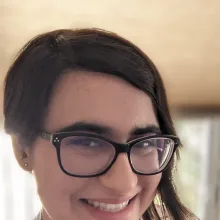
Outstanding Undergraduate Service: Bianca Lara
Bianca Lara is a senior pursuing dual majors: BS in Computer science and Mathematics with minors in Spanish and Statistics and Data Science.
Bianca is from Tucson, Arizona and she applied to both UA and ASU, but ultimately chose UA as she was more familiar with the campus and culture and the UA had better financial opportunities for her. While she took a computer science course at her high school, she didn't decide to seriously pursue CS until after she did a coding bootcamp with Google the summer before she started at UA.
Throughout her undergrad, Bianca was always involved in some form with the Women in Information and Computer Science (WICS) club. She started as a member her Freshman year and decided to apply for an officer position her Sophomore year. By her Junior year, Bianca was acting as Co-President with Hsin-Yu Chen. During her time with WICS, the officers and Bianca have been working to create a space for underrepresented genders in the technology fields and the computer science department. They have kept up their weekly meeting activities to provide engaging and informational experiences for the club members. Bianca hopes that the club can continue to expand off of the foundations that the previous officers and her have built.
When she has the time, she likes to play video games. She has been chipping away at Persona 5 Strikers on the Switch. Once she moves after she graduates, she would also like to get a keyboard to try and pick up piano again. For the past 3 summers Bianca has been interning at Google. The first 2 internships were with their STEP program and the last one was with the SWE intern program. She is also working on her honors capstone which is a web-visualization project for environmental and public health data in Arizona. Bianca will be starting a full-time position with Google next August! If she finds a particular part of computer science that interests her while working, then she would like to go back to graduate school to study that subject further.
Bianca would like to recognize Hsin-Yu Chen for the work she has done alongside herself as Co-President of WICS. She would also like to recognize all of our officers: Carolina Rivera, Kiara Hernandez, Tyler Steffen, and Marisa Galan. You all did amazing work with WICS and she is glad she got the chance to meet you all through their club! Bianca would also like to recognize Kate Isaacs for being their club's faculty member. Professor Isaacs also acted as the faculty advisor to her honors capstone and was very helpful to her undergraduate experience.
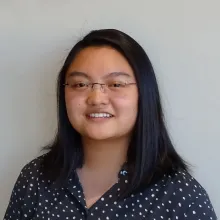
Outstanding Undergraduate Service: Hsin-Yu Chen
Hsin-Yu Chen is a senior pursuing a BS in Computer Science with a minor in Chinese. Hsin-Yu was born and raised in Tucson, AZ. Before deciding on majoring in CS, she was actually planning on studying Molecular and Cellular Biology because she didn't know what else to do at the time. However, She took the brand new graphics and animation course at her high school in junior year and decided then that she enjoyed programming enough to pursue a CS degree.
As a CS student Hsin-Yu had the amazing opportunity to be one of the co-presidents for Women in Information and Computer Science (WICS) in the CS department for the past 2 years. Before that, she took part in the CS Ambassador program where she did tours for prospective students and volunteered at various CS events in other K-12 schools around Tucson. Outside of school, she recently got into building custom mechanical keyboards, so she likes sto look into keycap sets that she cannot currently afford. Besides that, Hsin-Yu likes to read fantasy novels and/or (re)watch studio ghibli films on end.
In the summer of 2019, Hsin-Yu applied for a co-op experience at IBM here in Tucson where she participated in their summer internship and continued working up until May 2020. She did small projects involving working on the mainframe while programming in PL/X. Then in July of 2020, she was able to work remotely for American Express's summer internship where she utilized python to refactor code and test a version control tool for the marketing team. As of now, Hsin-Yu's career goals is to continue working full-time at American Express until she decides what masters degree to pursue. She also hopes to continue doing community service work through other STEM programs that help schools in need.
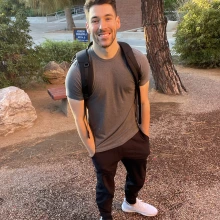
Outstanding Undergraduate Teaching: Christian Capriotti
Christian Capriotti is a senior pursuing a BS in Computer Science. Christian is from Phoenix, Arizona and chose to go to UofA because of the strong academic rankings as well as the city of Tucson itself; he loves the community and college town feel. His father is also a UA alumni and he grew up watching UA basketball, so ASU wasn't a possibility :)
Christian originally went into CS blindly, he was totally unfamiliar with the subject but knew it involved logic, math, and some creativity. But once he began programming, he immediately fell in love and knew that CS was the right choice. Christin doesn't see himself becoming bored in this field, there's an endless amount of paths to take, problems to solve, and things to learn. The money is nice, too!
As a CS student, Christian was a UGTA for CSC 210 during the 2019-2020 academic year, and has been the Course Coordinator for CSC 210 during the 2020-2021 academic year. In his free time, he loves being outdoors, especially hiking and biking. He enjoys working out, playing basketball, and has recently gotten into rock climbing. At home he spends my time playing chess, guitar, and spending far too much time on YouTube and Reddit.
Last summer Chrisitan interned at USAA in Phoenix on the Mobile Application Team. As of right now, his short term goal is to be the best software developer he can possibly be and continue to learn as much as possible. His long term goal is to go into teaching once I've gained more experience in the industry. There's so many people that Christian would love to recognize and thank. A few people heâd like to specifically mention are Tyler Conklin, Bridget Radcliff, and Arthur Jordan. Each of them have provided him with so much support and encouragement. He wouldn't be receiving this award if it weren't for them!
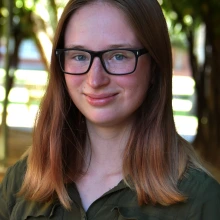
Outstanding Graduating Senior (Spring 2021): Amanda Bertsch
Amanda Bertsch is a senior pursuing a double major in Computer Science and mathematics with minors in linguistics and creative writing. Amanda is from Prescott, Arizona and when applying for colleges, she really had her heart set on going out of state. She chose to study at the UA because of a scholarship opportunity she was offered, and she is so glad she did! Her mom worked as a software engineer for most of her career, and she encouraged her to start programming early, so Amanda knew that she wanted coding to be part of her college experience coming in. She started in engineering, planning to double major in CS, but she eventually dropped engineering to focus on CS.
As a Computer Science student, Amanda runs the university's Girls Who Code program, which teaches coding concepts to 6th-12th grade girls. She also coordinates outreach for the UA Rube Goldberg club, which visits middle schools to talk about engineering. This is her third semester as a computer science TA - she's TA'd for CSC 345 and CSC 473. Amanda also served as the undergraduate representative on the summer 2020 department head search committee. In her free time, Amada is an avid writer-- she writes and reads a lot of science fiction and fantasy. She loves to cook and play video games, and she spends a lot of time with her partner and their 1-year-old puppy. She's also recently been very into woodworking and metalworking.
Amanda has interned twice at Microsoft and is currently writing her honors thesis with Dr. Bethard in the School of Information, focusing on bias detection on Wikipedia. She also works for the Arizona Geologic Survey as a student researcher working on a natural language processing project. Amanda's career goal is to pursue a PhD, continuing her work in natural language processing. She'd like to work in an industry lab doing research before eventually returning to academia. Amanda also wants to start a maker space focused on welcoming people who don't traditionally do "maker" projects! Amanda would like to thank all the professors who advised her over the last year as she went through the grad school application process! In the department, that includes Dr. Anson, Dr. Debray, Dr. Lowenthal, Dr. Levine, and Dr. Strout. She felt very intimidated in her first CS classes because she didn't feel like she fit in-- She couldn't be a "serious" CS student because she didn't spend every second of her life coding, most of my hobbies were outside CS, and I didn't look like most of my classmates. If you're in the same spot, know that it gets better! A lot of people have a very specific perception of what a programmer looks like, but there's a place in CS for everyone.
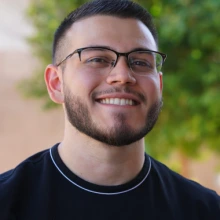
Outstanding Graduating Senior (Fall 2020): Adrian Bao
Adrian Bao is a CS Alumni who graduated with a BS degree in Fall 2020. Adrian is a Tucson native and attended Pima Community College before transferring to the UA. His interest in Computer Science sparked when he realized that there was a vast number of specialties or emphasis one can choose from when going into this industry. It amazed him that a degree in Computer Science could allow individuals to work in a wide variety of fields such as Frontend, Security, Embedded Systems, AI, etc.
Adrian completed a virtual internship with Amazon in summer of 2020 and was then hired as a Software Development Engineer. Adrian is incredibly grateful to his family for their continued support throughout his academic journey. He is also thankful for his friends whom heâs had a chance to collaborate with and grow alongside during his time at UA as well as a special shout out to his mentor, Arthur Jordan, for helping him navigate academics and industry. Finally, he'd like to thank Edwin Skidmore and his colleagues at CyVerse who welcomed him as a student with no experience, supported his learning & growth, and provided him with the tools & experience he needed to succeed in industry. Adrian couldn't have done it without you all so thank you!
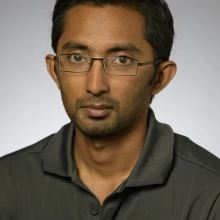
Outstanding Graduate Scholarship: Reyan Ahmed
Reyan Ahmed is a 5th-year grad student pursuing a Ph.D. in Computer Science with a minor in mathematics. Reyan is from Bangladesh and he decided to attend the UofA because he was motivated by the research of the algorithm group at the CS department. Reyan joined as a Ph.D. student in Fall 2016 after he had completed his master's degree at Bangladesh University of Engineering and Technology. As a CS grad student, Reyan is working on visualization projects that demonstrate the interconnectivity of different research topics which is essential for conducting a successful research project. In his free time, Reyan enjoys reading books and watching movies. His career goal is to obtain a Tenure-track position.
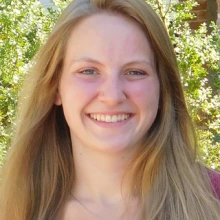
Outstanding Graduate Teaching: Rebecca Faust
Rebecca Faust is a 5th year student pursuing a PhD in Computer Science. Rebecca is from Missoula, Montana and she completed her undergraduate at the University of Montana where she double majored in Computer Science and Mathematics. After Rebecca graduated, she came to the University of Arizona for her Ph.D. As a CS student, Rebecca was a member of the CS Graduate Student Council from 2018-2020. She also served as the Graduate Student Member on the CS Department 7-year Academic Program Review Committee and the Department Head 5-year Review Committee. In her free time, Rebecca enjoys playing board games, baking, crocheting, and playing with her dog. As part of her research, Rebecca works with Dr. Carlos Scheidegger, Associate Professor for the CS department. She is also a GFSD fellow working with Dr. William Bernstein at NIST. Her research focuses on creating visualization methods and systems for understanding programs used in data analysis. After completing her Ph.D., Rebecca hopes to complete a postdoc before becoming faculty and forming a research group of her own.
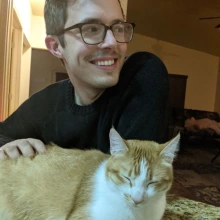
Outstanding Graduate Service: Brandon Neth
Brandon Neth is a 1st year grad student pursuing a PhD in Computer Science with a minor in Sociology. After growing up outside Cleveland, Ohio, Brandon moved to Tucson in 2015 to complete his undergraduate education. While he was originally studying engineering, taking an introductory programming course made him immediately switch to CS, where he graduated with Honors in 2019. During that time, Brandon started doing program optimization research with Dr. Michelle Strout and was hooked. He's been researching with her ever since.
Brandon is currently the Vice President of the Computer Science Graduate Student Council and the graduate representative on the DEI committee. As an undergrad, he was involved with the CS Ambassadors program. Within the university, he is a newly elected representative for the Graduate and Professional Student Council, where he represents the interests of graduate students within the university. He is also a volunteer with the Campus Pantry, which works to combat food insecurity (which affects 30% of students) on campus and is involved with queer organizations on campus and a proud member of our union, United Campus Workers Arizona. Outside of school, Brandon likes playing video games (mostly Civilization) with friends. He is also an avid reader and part of 3 different book clubs. In 2020 he was super inspired by Marie Kondo's books on tidying/organizing, and has become somewhat of a tidying consultant for his friends and family. It's a lot of fun helping people develop their sensitivity to joy and seeing how much happier they are when all their possessions "spark joy."
Brandon has done internships at Massachusetts Institute of Technology Lincoln Laboratory where he worked on cybersecurity; Intuit, where he worked on micro service infrastructure; and will begin doing an internship at Lawrence Livermore National Lab this summer, where he will be working on the RAJA Performance Portability Library. Brandon has been doing research with Dr. Michelle Strout since 2017, first on binary-level automatic parallelization, then on parsing techniques and HPC program language support for data locality optimizations. Brandon's career goal is to contribute to programming language research. Programming languages are our interface to the systems that enable so much of scientific progress, and he loves the process of making that interface more intuitive. Wherever he ends up, he also wants to work towards reinventing the computing fields so the field is truly accessible and welcoming. Brandon would like to thank Dr. Michelle Strout for her constant guidance and support, his family and friends for their love and laughter, and to his fellow union members for inspiring a vision of a healthier, happier and more just workplace.
Staff Award
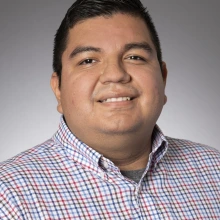
Alex Hernandez
Alex joined the department as a Undergraduate Academic Advisor in June 2019. He completed his BS in 2016 at the University of Arizona and his MEd in 2019 from NAU. Before his role as Advisor, Alex worked in the office of transfer credit and articulation as a student academic specialist. He met with transfer students/reviewing transfer credit to ensure their transition to the university smoother. He has been working alongside students since 2017, he has enjoyed every aspect of it. In his free time, Alex enjoys the outdoors, visiting new spots in town, and spend time with the people closest to him.
Alex was chosen for this award, because of his extreme support to the department's transfer articulation efforts. He also helped support the launch of the department's DEI page and provides insight on potential DEI initiatives. Alex is a strong advisor and stronger advocate for students!
Faculty Awards
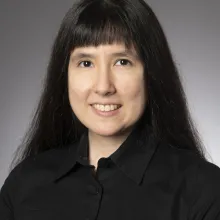
Faculty Research Award: Kate Isaacs
Kate is an assistant professor at the University of Arizona and a member of the Humans, Data, and Computers Lab (HDC). Her interests are at the intersection of data visualization and computing systems. Kate develops new methods of representing complex computing processes for exploration and analysis of their behavior, with applications to high performance computing, distributed computing, data science, program analysis, and optimization.
Kate was recognized with the research award because she produced two papers in premiere conference in visualization and she has multiple grants ongoing and submitted. She also graduated her first Ph.D student and advising several others!
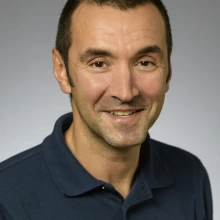
Faculty Research and Faculty Service Awards: Stephen Kobourov
Stephen is a professor for the Computer Science Department at the University of Arizona. His research interests are graph drawing and information visualization, algorithm design and data organization and geometric algorithms.
Stephen was recognized with both the research and faculty awards because of his excellent contributions to the department. He has published 12 papers and wrote 9 other manuscripts. He led a team that won Best Paper at Graph Drawing conference and has done external service including chairing the Graph Drawing steering committee and serving as editor for three top journals. He also helped make the College of Science Lecture Series go and volunteered for extra internal service, including the evaluation committee.
Not to mention, Stephen manages a dozen postdocs/grad students/undergrads and advised Reyan Ahmed, Ben Jacobsen, Kiana Thatcher, and Mason Yin (some of our award winners mentioned above).
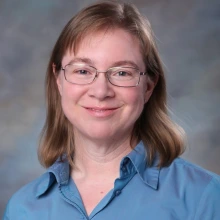
Faculty Service Award: Michelle Stout
Michelle has been a professor in the Department of Computer Science at the University of Arizona since August 2015. Her main research area is high performance computing and her research interests include compilers and run-time systems, scientific computing, and software engineering. She earned her Ph.D. at the University of California, San Diego in 2003 with Jeanne Ferrante and Larry Carter as co-advisors.
Michelle was recognized with this award because she did many external service including multiple program committees, the PLDI steering committee, and wrote 11 reference letters! She helped bring the Broadening Participation Plan online and stepped up into the interim head role for five months when it was really needed

Faculty Teaching Award: Ben Dicken
Ben has been a lecturer for the Department of Computer Science since January 2017. Ben's research interests are software engineering, web development, program analysis and computer science education.
Ben was chosen for this award because he was instrumental in standing up the department's teaching studio. He has handled 400 students in our intro course, CSc 110 --- live online and encouraged participation even in live online courses using PlayPosit. Not to mentioned he also volunteered to teach an additional course to better serve students!
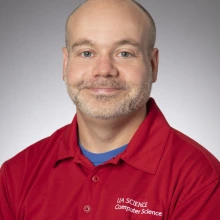
Faculty Teaching Award: Josh Levine
Josh is an associate professor in the Department of Computer Science at University of Arizona and he is a member of UAâs HDC Lab. His research interest are in visualization, geometric modeling, topological analysis, mesh generation, and computer graphics.
Josh was chosen for this award because he continues to innovate both the undergraduate and graduate data visualization courses and student comments on his classes, both formal and informal, are always extremely positive (even while they lament the workload)! Josh is also another go-to resource for faculty for new ideas about teaching.
Diversity, Equity, Inclusion (DEI) Awards
Inaugural award, recognizing Individuals that have provided outstanding service to the department towards DEI initiatives.

Student DEI Award: Sage Pezzulo
Sage Pezzulo, mentioned above as one of Gaileo Scholars was also awarded with the Student DEI Award.
Sage as been instrumental in creating our Department of Computer Science DEI pages and helped create and lead the CS DEI Student Advisory Board. Her hard work and insights were key for our DEI page and initiatives!
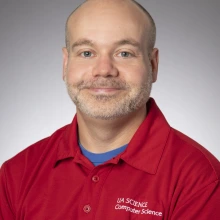
Faculty DEI Award: Josh Levine
Josh aside from being awarded with a faculty teaching award he also received this inaugural award!
Josh was chosen for this award because he served as the chair of the Department of Computer Science Diversity, Equity, and Inclusion Committee, he was Co-author of the department's Broadening Participation in Computing (BPC) plan and led the team developing the department's DEI webpages!

